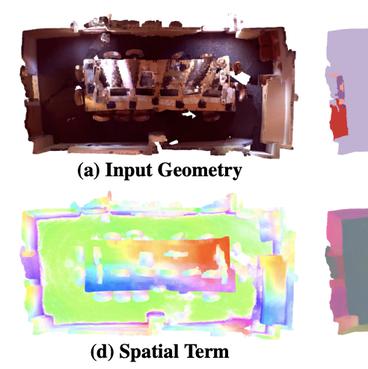Search Results for author: Kaichen Zhou
Found 18 papers, 7 papers with code
SCANet: Correcting LEGO Assembly Errors with Self-Correct Assembly Network
1 code implementation • 27 Mar 2024 • Yuxuan Wan, Kaichen Zhou, jinhong Chen, Hao Dong
To support research in this area, we present the LEGO Error Correction Assembly Dataset (LEGO-ECA), comprising manual images for assembly steps and instances of assembly failures.
WSCLoc: Weakly-Supervised Sparse-View Camera Relocalization
no code implementations • 22 Mar 2024 • Jialu Wang, Kaichen Zhou, Andrew Markham, Niki Trigoni
Despite the advancements in deep learning for camera relocalization tasks, obtaining ground truth pose labels required for the training process remains a costly endeavor.
OV-NeRF: Open-vocabulary Neural Radiance Fields with Vision and Language Foundation Models for 3D Semantic Understanding
no code implementations • 7 Feb 2024 • Guibiao Liao, Kaichen Zhou, Zhenyu Bao, Kanglin Liu, Qing Li
First, from the single-view perspective, we introduce Region Semantic Ranking (RSR) regularization by leveraging 2D mask proposals derived from SAM to rectify the noisy semantics of each training view, facilitating accurate semantic field learning.
SERF: Fine-Grained Interactive 3D Segmentation and Editing with Radiance Fields
no code implementations • 26 Dec 2023 • Kaichen Zhou, Lanqing Hong, Enze Xie, Yongxin Yang, Zhenguo Li, Wei zhang
Although significant progress has been made in the field of 2D-based interactive editing, fine-grained 3D-based interactive editing remains relatively unexplored.
MGDepth: Motion-Guided Cost Volume For Self-Supervised Monocular Depth In Dynamic Scenarios
no code implementations • 23 Dec 2023 • Kaichen Zhou, Jia-Xing Zhong, Jia-Wang Bian, Qian Xie, Jian-Qing Zheng, Niki Trigoni, Andrew Markham
Despite advancements in self-supervised monocular depth estimation, challenges persist in dynamic scenarios due to the dependence on assumptions about a static world.
Spherical Mask: Coarse-to-Fine 3D Point Cloud Instance Segmentation with Spherical Representation
no code implementations • 18 Dec 2023 • Sangyun Shin, Kaichen Zhou, Madhu Vankadari, Andrew Markham, Niki Trigoni
Coarse-to-fine 3D instance segmentation methods show weak performances compared to recent Grouping-based, Kernel-based and Transformer-based methods.
DynPoint: Dynamic Neural Point For View Synthesis
1 code implementation • NeurIPS 2023 • Kaichen Zhou, Jia-Xing Zhong, Sangyun Shin, Kai Lu, Yiyuan Yang, Andrew Markham, Niki Trigoni
The introduction of neural radiance fields has greatly improved the effectiveness of view synthesis for monocular videos.
Multi-body SE(3) Equivariance for Unsupervised Rigid Segmentation and Motion Estimation
1 code implementation • NeurIPS 2023 • Jia-Xing Zhong, Ta-Ying Cheng, Yuhang He, Kai Lu, Kaichen Zhou, Andrew Markham, Niki Trigoni
A truly generalizable approach to rigid segmentation and motion estimation is fundamental to 3D understanding of articulated objects and moving scenes.
ConsistentNeRF: Enhancing Neural Radiance Fields with 3D Consistency for Sparse View Synthesis
1 code implementation • 18 May 2023 • Shoukang Hu, Kaichen Zhou, Kaiyu Li, Longhui Yu, Lanqing Hong, Tianyang Hu, Zhenguo Li, Gim Hee Lee, Ziwei Liu
In this paper, we propose ConsistentNeRF, a method that leverages depth information to regularize both multi-view and single-view 3D consistency among pixels.
Sample, Crop, Track: Self-Supervised Mobile 3D Object Detection for Urban Driving LiDAR
no code implementations • 21 Sep 2022 • Sangyun Shin, Stuart Golodetz, Madhu Vankadari, Kaichen Zhou, Andrew Markham, Niki Trigoni
Supervised approaches typically require the annotation of large training sets; there has thus been great interest in leveraging weakly, semi- or self-supervised methods to avoid this, with much success.
DevNet: Self-supervised Monocular Depth Learning via Density Volume Construction
1 code implementation • 14 Sep 2022 • Kaichen Zhou, Lanqing Hong, Changhao Chen, Hang Xu, Chaoqiang Ye, Qingyong Hu, Zhenguo Li
Self-supervised depth learning from monocular images normally relies on the 2D pixel-wise photometric relation between temporally adjacent image frames.
No Pain, Big Gain: Classify Dynamic Point Cloud Sequences with Static Models by Fitting Feature-level Space-time Surfaces
1 code implementation • CVPR 2022 • Jia-Xing Zhong, Kaichen Zhou, Qingyong Hu, Bing Wang, Niki Trigoni, Andrew Markham
Scene flow is a powerful tool for capturing the motion field of 3D point clouds.
 Ranked #1 on
3D Action Recognition
on NTU RGB+D
Ranked #1 on
3D Action Recognition
on NTU RGB+D
DHA: End-to-End Joint Optimization of Data Augmentation Policy, Hyper-parameter and Architecture
no code implementations • 13 Sep 2021 • Kaichen Zhou, Lanqing Hong, Shoukang Hu, Fengwei Zhou, Binxin Ru, Jiashi Feng, Zhenguo Li
In view of these, we propose DHA, which achieves joint optimization of Data augmentation policy, Hyper-parameter and Architecture.
DiffAutoML: Differentiable Joint Optimization for Efficient End-to-End Automated Machine Learning
no code implementations • 1 Jan 2021 • Kaichen Zhou, Lanqing Hong, Fengwei Zhou, Binxin Ru, Zhenguo Li, Trigoni Niki, Jiashi Feng
Our method performs co-optimization of the neural architectures, training hyper-parameters and data augmentation policies in an end-to-end fashion without the need of model retraining.
Suggestive Annotation of Brain Tumour Images with Gradient-guided Sampling
no code implementations • 26 Jun 2020 • Chengliang Dai, Shuo Wang, Yuanhan Mo, Kaichen Zhou, Elsa Angelini, Yike Guo, Wenjia Bai
Machine learning has been widely adopted for medical image analysis in recent years given its promising performance in image segmentation and classification tasks.
VMLoc: Variational Fusion For Learning-Based Multimodal Camera Localization
1 code implementation • 12 Mar 2020 • Kaichen Zhou, Changhao Chen, Bing Wang, Muhamad Risqi U. Saputra, Niki Trigoni, Andrew Markham
We conjecture that this is because of the naive approaches to feature space fusion through summation or concatenation which do not take into account the different strengths of each modality.
Tighter Bound Estimation of Sensitivity Analysis for Incremental and Decremental Data Modification
no code implementations • 6 Mar 2020 • Kaichen Zhou, Shiji Song, Gao Huang, Wu Cheng, Quan Zhou
Specifically, the proposed algorithm can be used to estimate the upper and lower bounds of the updated classifier's coefficient matrix with a low computational complexity related to the size of the updated dataset.
Smart Train Operation Algorithms based on Expert Knowledge and Reinforcement Learning
no code implementations • 6 Mar 2020 • Kaichen Zhou, Shiji Song, Anke Xue, Keyou You, Hui Wu
Then we develop two algorithms for optimizing the energy efficiency of train operation.











